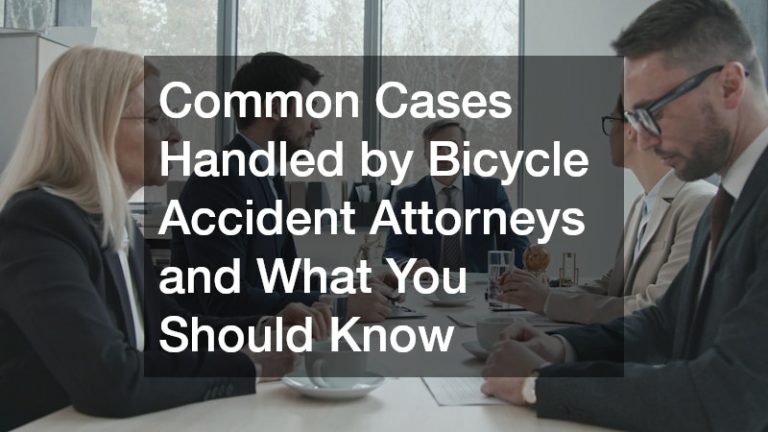Bicycling can be a convenient, healthy, and environmentally friendly mode of transportation, but it also carries risks, particularly on busy streets or in areas with poor road infrastructure. Accidents involving bicycles can result in serious injuries, property damage, and financial burdens. When such incidents occur, seeking legal guidance from experienced bicycle accident attorneys can help victims understand their rights and pursue appropriate compensation.
Types of Bicycle Accidents
Bicycle accidents come in various forms, and the circumstances often determine liability and potential legal remedies. Some of the most common types include:
Collisions with Motor Vehicles: The majority of serious bicycle accidents involve cars, trucks, or buses. These collisions can lead to traumatic injuries due to the lack of protection cyclists have compared to motorists.
Bicycle accident attorneys often handle cases where drivers fail to yield, run red lights, or engage in distracted driving, resulting in harm to cyclists.
Hit-and-Run Accidents: In some cases, a motorist may flee the scene after striking a cyclist. These incidents can be particularly challenging, as identifying the responsible party may take extensive investigation. Attorneys specializing in bicycle accidents can work with law enforcement, witnesses, and traffic camera footage to locate the at-fault driver and secure compensation for the victim.
Road Hazards and Poor Maintenance: Potholes, uneven pavement, debris, and poorly designed bike lanes can cause cyclists to lose control. Bicycle accident attorneys may represent clients against municipal authorities or private entities responsible for maintaining safe road conditions. These cases require detailed documentation of the hazard and evidence linking it to the resulting injuries.
Dooring Accidents: “Dooring” occurs when a parked vehicle’s occupant opens a door into the path of a cyclist. This can result in significant injuries, especially if the cyclist is thrown into traffic. Attorneys experienced in bicycle accident cases are skilled at gathering witness statements, traffic laws, and insurance information to establish liability.
Bicycle-to-Bicycle Collisions: Although less common than vehicle-related accidents, collisions between cyclists—especially in busy urban areas or competitive events—can still cause injuries and disputes over responsibility. Legal assistance can help determine fault and negotiate settlements.
Why You Need a Bicycle Accident Attorney
Even minor bicycle accidents can have long-lasting consequences. Medical bills, lost wages, rehabilitation costs, and emotional distress can accumulate quickly. Bicycle accident attorneys provide valuable assistance in navigating these challenges. They help clients:
-
Assess Liability: Determining who is legally responsible for an accident is often complex. Attorneys investigate the circumstances, collect evidence, and review traffic laws to build a compelling case.
-
Handle Insurance Claims: Insurance companies may attempt to minimize payouts or deny claims. A knowledgeable attorney negotiates with insurers to ensure victims receive fair compensation for injuries and property damage.
-
Represent in Court if Necessary: Some cases may require litigation. Attorneys guide clients through court proceedings, present evidence, and advocate for maximum recovery.
-
Maximize Compensation: Experienced attorneys understand the nuances of calculating damages, including medical costs, lost income, pain and suffering, and long-term impacts on quality of life.
What to Know Before Hiring a Bicycle Accident Attorney
When seeking legal representation, it’s important to consider a few key factors:
Experience and Specialization: Not all personal injury lawyers are equally adept at handling bicycle accident cases. Choose an attorney with a proven track record in this area to ensure they understand the unique challenges cyclists face.
Communication and Accessibility: A strong attorney-client relationship relies on clear communication. You should feel comfortable discussing your case, asking questions, and receiving updates.
Fee Structure: Many bicycle accident attorneys work on a contingency fee basis, meaning they only collect a percentage of the settlement if you win. Confirm their fee structure upfront to avoid surprises.
Documentation: Gather as much information as possible about the accident, including photos, medical records, witness contacts, and police reports. The more detailed the documentation, the stronger your attorney’s case will be.
Timeliness: Statutes of limitations vary by jurisdiction, often ranging from one to three years for personal injury claims. Contacting a bicycle accident attorney promptly ensures that legal deadlines are met and evidence is preserved.
Settlements and Litigation
Many bicycle accident cases are resolved through negotiated settlements. Attorneys work to reach a fair agreement with insurance companies or opposing parties, potentially avoiding the time and stress of a trial. However, if a settlement cannot adequately compensate the victim, litigation may be necessary. In court, a skilled attorney presents evidence, cross-examines witnesses, and argues for the full value of damages.
Bicycle accidents can happen to anyone, and the consequences can be significant. From collisions with vehicles to road hazards and dooring incidents, these cases require careful investigation and legal expertise. Bicycle accident attorneys play a vital role in protecting victims’ rights, negotiating with insurance companies, and pursuing compensation for medical expenses, lost income, and pain and suffering.
Understanding the types of accidents, potential liabilities, and the benefits of professional legal representation can make a substantial difference in recovery outcomes. If you or a loved one has been involved in a bicycle accident, consulting a qualified attorney promptly is crucial to ensure your rights are protected and your claims are handled effectively.







